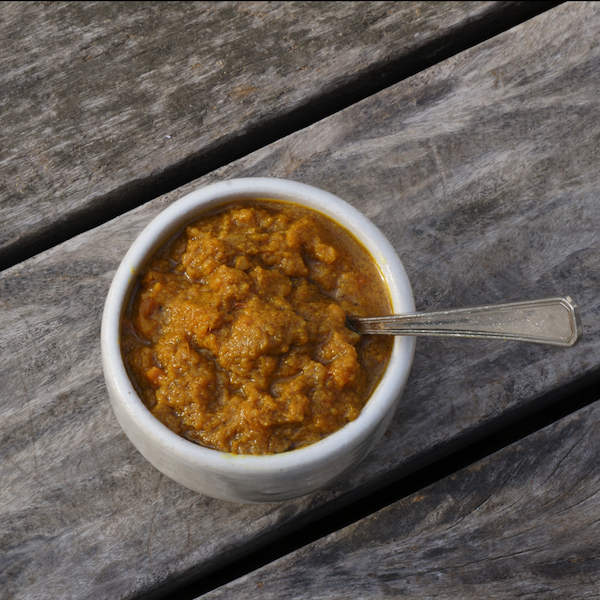
| Prep Time | 15 minutes |
| Cook Time | 30 minutes |
| Passive Time | 0 |
| Servings |
servings
|
- 3 tbsp Yellow Indian Curry Powder (see below to make your own)
- 2 tsp Chilli Powder
- 5 Bay Leaves
- 1 tsp Cinnamon Powder
- 1 tsp Peppercorns
- 1 tsp Turmeric Powder
- 2 Brown Onion
- 4 nobs Ginger (1 inch / 2 cm nob)
- 3 nobs Turmeric (1 inch / 2 cm nob)(fresh, roughly chopped) (if no fresh Turmeric, add 2 tsp Turmeric Powder)
- 4 cloves Garlic
- 2 cups Tomatoes
- 2 tsp Sea Salt
- 2 tbsp Cumin Powder
- 2 tbsp Coriander Powder
- 2 tbsp Turmeric Powder
- ½ tsp Mustard Seed Powder
- ½ tsp Ginger Powder
Ingredients
Yellow Indian Curry Paste
Yellow Indian Curry Powder
|
|
- Yellow Indian Curry Powder: Grind/blend all ingredients together. Set aside.
- Blend the dry spices together and then warm on medium heat on a pan for a couple minutes. Set aside (Dry spices = Curry Powder, Chilli Powder, Bay leaves, Cinnamon, Peppercorns, Turmeric Powder)
- Add 2 tbsp Coconut Oil in a large pot and cook the Onions until soft.
- Add the fresh Ginger, Turmeric (or Turmeric Powder) and Garlic and cook for a 5 minutes until mixture thickens, stirring often.
- Add the dry spices and keep stirring until paste turns golden.
- Chop the tomatoes and add to the pot. Add the Salt and cook and stir often until tomatoes soften.
- Cook until no liquid is left and you have a nice thick paste.
*Store left over Yellow Indian Curry Powder in a sealed glass jar in your spice cupboard.
*I make big batches of the Yellow Indian Curry Paste and freeze in portions for future use.
*Here is a beautiful Yellow Indian Curry Dish that you can make using this paste.
*Store the Yellow Indian Curry Paste in a glass jar in the fridge to use to make fresh curries like the Yellow Indian Curry Dish, and also fresh Yellow Indian Curry Dip. If you use a little Olive oil to coat the inside of the glass jar and seal it, it keeps well for weeks in the fridge.
Clean Eating Tips to remember:
*Stainless Steel and Ceramic or Glass Cookware are the safest materials to cook in with the least amount of leaching into food when heat is applied. A high quality set of cookware is essential and will last a lifetime - and a longer lifetime at that because of it.
*Stainless Steel, Food-grade Silicon or Wooden Cooking Utensils are the safest materials to cook with with the least amount of leaching into food when heat is applied.
*Olive Oil - it’s best not to cook with Olive Oil, always consume raw. Best to drizzle Olive Oil over food just before serving. It’s better to avoid cooking with Olive Oil as it is a delicate oil and is damaged and becomes harmful to ingest when heated.
*Better oils for cooking with have a higher smoke point/less free radical forming when heated— Coconut Oil, Macadamia Oil and Grapeseed Oil
